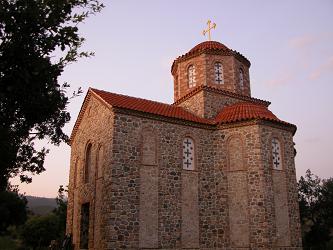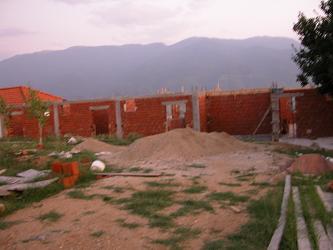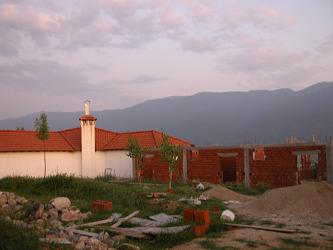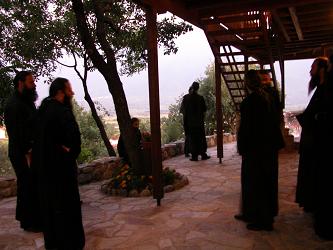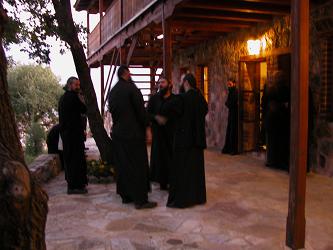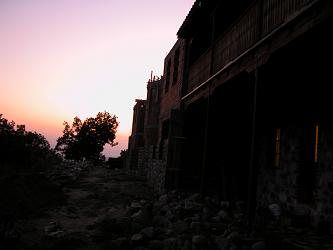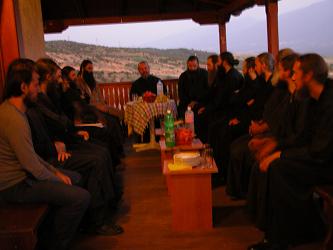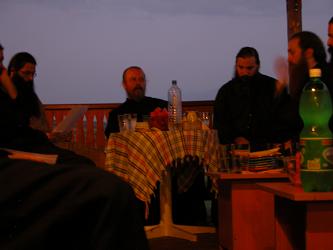Fit for the Kingdom of God ( 19.07.2009 )
And another also said, “Lord, I will follow You, but let me first go and bid them farewell who are at my house.” But Jesus said to him, “No one, having put his hand to the plow, and looking back, is fit for the kingdom of God” (Luke 9:61-62).
Children, as early as from the moment of Holy Baptism itself we are called, according to the holy apostle Paul, to reckon ourselves to be dead indeed to sin, but alive to God in Christ Jesus our Lord (Rom. 6:11), in other words, this means nothing but to attaint in our spiritual growth at least the level of illumination of the mind. Clearly, all of us who have come to a monastery had not accomplished our assignment and had not justified our calling, otherwise, if it were not as I say, why should have we come here at all? I will say this again a bit clearer: precisely our coming to a monastery is a testimony, an indicator that we are a failure when it comes to our sacramental, baptismal vows. The previously said applies even more if we have come to a monastery for no other reason but exactly with this awareness—that we have failed in our Christian calling and under circumstances of life in the world we find not enough strong will to fight for our goal. Also, that we have realized from experience that our Lord the Godman Jesus Christ is true and just in saying that He did not come to save the righteous and the healthy, but the sick and sinners.
Still, even if we have not come to a monastery out of these reasons and with this idea, it is never too late and nothing is too hopeless. Through the written and interpreted from the Holy Bible, through the Holy fathers, through practice itself, through my counsels as well as through the monastery typikon we will soon observe that it is a good thing we have come here in the haven of our spiritual father’s blessing, and this precisely because of the slackness and powerlessness of our will to fight against the spirits of evil in the heavenly places on the battlefield of the world, which lies in evil (1 John 5:19). When I say that we have not come due to our sinfulness and sickness, it does not mean we have not come with a good reason. Good reasons, which at the moment may prevail at our deciding, are also the power of the first grace or the desire to dedicate consciously and out of love our life to Him. Yet, as I said, the safest reason, which will not bring the world along with us in the monastery, is the awareness of our sinfulness and sickness—that is, the awareness of our failure in the world. For, the effect of the first grace will wear off as also the effect of the love enchantment, but the remembrance of the shame at the defeat and the desire for a final victory never fades away in any true soldier of Christ.
And, the greatest danger for the monastic struggle, children, is exactly this: to bring along with us in the monastery what we have allegedly at first given up—the world. Of course, “world” in terms of passions and sin; “world”, first and foremost, in terms of pride as the reason for any fall. You know well what our apostle paul’s words mean, the world has been crucified to me, and I to the world (Gal. 6:14). Let us recall, the meaning is that not only have we left the world outwardly but we have likewise renounced it inwardly. Now, let me ask you, children, and this is my greatest motive for this assembly: if with our coming to a monastery we have not renounced the world even outwardly, then how do we possibly expect to free ourselves from it inwardly? Will not then Christ’s words apply to us, “No one, having put his hand to the plow, and looking back, is fit for the
When, God forbid, all this would eventually happen to any of us, it would mean nothing but a double failure. We have missed the target after our Baptism, and we miss it now as well if we do not repent, at the attempt to reach it again through the monastic consecration. Because the aim is the same in both cases: to reach in our spiritual growth the level of illumination of the mind. Now, how could we be illumined if we are bound by the sin of pride and by the great idea of ourselves, which is man’s main disease, and if we are deadened to the mind-and-heart prayer? And, just as the aim is the same, so is also the term characteristic of and used both for baptism and monastic tonsure—‘illumination’. Just look at the church service of these two Holy Mysteries and in both texts you will encounter the term ‘illumination’. And, just as the aim and the term are the same, so is also the preparation for the two sacramental events. I say sacramental, because where the grace of the Holy Spirit manifests and where sins are forgiven, there all is a Holy Mystery, whether little or great. As for the Holy Mysteries, they all spring from and then again, enriched by our volitional struggle for fulfillment of God’s will, flow into the central Holy Mystery—the Church, the Body of Christ.
What does it precisely mean to bring the world into the monastery? It usual takes place, as I said, after the effect of the first grace has worn off or when the effect of love enchantment has worn off. It means to abandon the struggle for estrangement (i.e. life as an exile) or the struggle for dying to this world, remember!, before we acquire the gift of the mind-and-heart prayer. These are actually two impermissible things: first, self-willed interest in all that happens in the world—be it in the field of politics, culture, science, sport, music, or alike; self-willed cherishing of old and building of new relations with people of the world; self-willed competition with others in worldly knowledge, in fashion, in body care, in vehicles, in buildings etc; self-willed planning of one’s own future; hiding of what we are doing from our spiritual father, etc. the reason for all I have listed is emptiness and desperation inside us, and the consequence of it all is yet greater emptiness and desperation. Even the building of close relations in the monastery itself, to which one rarely pays attention, is not useful. Our relationship with the monastery residents should be simply official outwardly, while inwardly it should be filled with ascetical love and humility, all until the attainment of the gift of the mind-and-heart prayer.
Second, and most important: abandonment of the struggle for absolute wholehearted obedience. That is exactly why we live in a monastery: so that we can place our mind into a healing process through an actual and permanent struggle for obedience to our spiritual father—that and absolutely nothing else. How sad it feels to see how you, inebriated by your own logic, your own plans, and your own way of seeing things (even if they turn out to be true), bring yourself to a state when my words can reach you by no means—that is, you bring yourself to a state of discarding the struggle for obedience, the process of healing, and, automatically, all monastic. To be yet clearer: what if your logic, your plans, or your way of seeing things turn out to be more accurate than mine? First, you have come here to heal your mind (unite it to its essence in the heart) for the beholding of God, placing it into a healing process through an actual and permanent struggle for obedience to the spiritual father, which is the very reason for your entering the monastery and which is incomparably higher aim than anything earthly, rather than to prove your intelligence over earthly matters instead and walk off the road on which you have embarked before you have seriously managed to set a foot on it. The only “suitable” place for such proving is the world, not the monastery. And, what if you, let us say, prove it? “For what profit is it to a man if he gains the whole world, and loses his own soul?” (Matthew 16:26), the Godman Christ asks you. And second, do you not know that the main sign God has let us carry out our own will i.e. the sign that God has abandoned us, is when it turns out that you were right about something, as opposed to your spiritual father? Also, that this is the situation following which one usually leaves one’s spiritual father? There are examples. Think and answer me, why!? The holy apostle Paul says, And do not be conformed to this world, but be transformed by the renewing of your mind, that you may prove what is that good and acceptable and perfect will of God (Rom. 12:2).
Therefore, children, let us repent while we still have time and say together with the apostle Paul, Yet indeed I also count all things loss for the excellence of the knowledge of Christ Jesus my Lord, for whom I have suffered the loss of all things, and count them as rubbish, that I may gain Christ (Phil. 3:8). You know the three monastic rules: first, non-identification with thoughts, desires, and feelings until they are checked with the spiritual father (obedience); second, proper confession, from the starting position ‘it is all my fault’; and third, continuous and intensive ascetical-hesychastic struggle up to the opening of the heart for the mind-and-heart prayer. Contrary behavior to these three rules is: first, disobedience (both inward and outward); second, judging and condemnation of others and hiding of what has happened to us (false confession); and third, discontinuous ascetical-hesychastic struggle. With the fulfillment of these rules we will attain to ‘the change of mind’ (repentance)—that is, with God’s help, we will humble our proud, distracted, and darkened mind, collect it prayerfully in the heart, and illumine it. The fulfillment of the three monastic rules purifies and opens the heart to the prayer inside it and to the love of God, while their non-fulfillment makes our monastic struggle and name meaningless and we remain part of the world.
I could also explain further the text regarding the Holy Mystery of Priesthood, because the aim of the preparation for this Holy Mystery as well is illumination. As I have told you on other occasions: what if we stand physically before the shrine’s altar if we cannot stand with our mind before our heart’s altar? Yet about this some other time. There are a lot more things I could write and indicate to you, children. What you will do and how you will do it, what will be and how it will be—from what I see now in you. Naturally, if you do not repent or if you abandon the struggle for repentance. Or do you think I need your confession in order to know what you are doing? I know when someone has the prayer of the heart and when one does not; also, why one does not have it. All else are nonessential details. Christ knew who would sit on His right and on His left in His glory, and also who would dip his hand in the dish with Him and betray Him. Why did they who betrayed Christ act that way? For no other reason but because friendship with the world (ultimately) is enmity with God, in other words, whoever therefore wants to be a friend of the world makes himself an enemy of God (James 4:4).
Therefore, children, do not love the world or the things in the world, the holy apostle John the Theologian says. If anyone loves the world, the love of the Father is not in him. For all that is in the world—the lust of the flesh (pleasure-indulgence), the lust of the eyes (avarice), and the pride of life (vainglory)—is not of the Father but is of the world (1 John 2:15-16). Thus, all that I am here explaining you and warning is with the aim we to repent wholeheartedly, to reject the world and what is of the world from our monastic life, and to enter into the joyous mystery of that ‘already, and not yet’. Already dead to sin and the world, and not yet, naturally. We already foretaste eternity in our heart, and not yet, in the fullness of face to face. We already live the Kingdom of God in the assembly at the Holy Eucharist, and we have not yet terminated our mission in the world. We are already saved, and not yet fully, out of love for our fellowmen and all created. For our monastic life to have meaning and joy and fulfillment to the glory of God and in honor of our Sovereign Lady the Theotokos and Ever-Virgin Mary, the salvation of all monastics. Amen!
Metropolitan Nahum of Strumica
